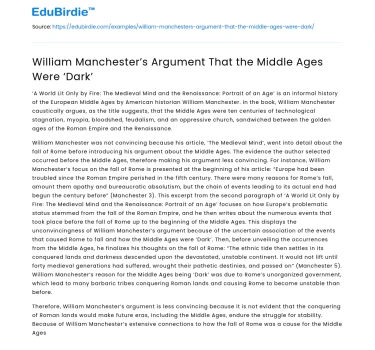‘A World Lit Only by Fire: The Medieval Mind and the Renaissance: Portrait of an Age’ is an informal history of the European Middle Ages by American historian William Manchester. In the book, William Manchester caustically argues, as the title suggests, that the Middle Ages were ten centuries of technological stagnation, myopia, bloodshed, feudalism, and an oppressive church, sandwiched between the golden ages of the Roman Empire and the Renaissance.
William Manchester was not convincing because his article, ‘The Medieval Mind’, went into detail about the fall of Rome before introducing his argument about the Middle Ages. The evidence the author selected occurred before the Middle Ages, therefore making his argument less convincing. For instance, William Manchester’s focus on the fall of Rome is presented at the beginning of his article: “Europe had been troubled since the Roman Empire perished in the fifth century. There were many reasons for Rome’s fall, amount them apathy and bureaucratic absolutism, but the chain of events leading to its actual end had begun the century before” (Manchester 3). This excerpt from the second paragraph of ‘A World Lit Only by Fire: The Medieval Mind and the Renaissance: Portrait of an Age’ focuses on how Europe’s problematic status stemmed from the fall of the Roman Empire, and he then writes about the numerous events that took place before the fall of Rome up to the beginning of the Middle Ages. This displays the unconvincingness of William Manchester’s argument because of the uncertain association of the events that caused Rome to fall and how the Middle Ages were ‘Dark’. Then, before unveiling the occurrences from the Middle Ages, he finalizes his thoughts on the fall of Rome: “The ethnic tide then settles in its conquered lands and darkness descended upon the devastated, unstable continent. It would not lift until forty medieval generations had suffered, wrought their pathetic destinies, and passed on” (Manchester 5). William Manchester’s reason for the Middle Ages being ‘Dark’ was due to Rome’s unorganized government, which lead to many barbaric tribes conquering Roman lands and causing Rome to become unstable than before.
Save your time!
We can take care of your essay
- Proper editing and formatting
- Free revision, title page, and bibliography
- Flexible prices and money-back guarantee
Therefore, William Manchester’s argument is less convincing because it is not evident that the conquering of Roman lands would make future eras, including the Middle Ages, endure the struggle for stability. Because of William Manchester’s extensive connections to how the fall of Rome was a cause for the Middle Ages to be named the ‘Dark Ages’, his argument is not convincing.
Did you like this example?
Make sure you submit a unique essay
Our writers will provide you with an essay sample written from scratch: any topic, any deadline, any instructions.
Cite this paper
-
APA
-
MLA
-
Harvard
-
Vancouver
William Manchester’s Argument That the Middle Ages Were ‘Dark’.
(2022, September 01). Edubirdie. Retrieved December 26, 2024, from https://edubirdie.com/examples/william-manchesters-argument-that-the-middle-ages-were-dark/
“William Manchester’s Argument That the Middle Ages Were ‘Dark’.” Edubirdie, 01 Sept. 2022, edubirdie.com/examples/william-manchesters-argument-that-the-middle-ages-were-dark/
William Manchester’s Argument That the Middle Ages Were ‘Dark’. [online].
Available at: <https://edubirdie.com/examples/william-manchesters-argument-that-the-middle-ages-were-dark/> [Accessed 26 Dec. 2024].
William Manchester’s Argument That the Middle Ages Were ‘Dark’ [Internet]. Edubirdie.
2022 Sept 01 [cited 2024 Dec 26].
Available from: https://edubirdie.com/examples/william-manchesters-argument-that-the-middle-ages-were-dark/
copy






 Stuck on your essay?
Stuck on your essay?

